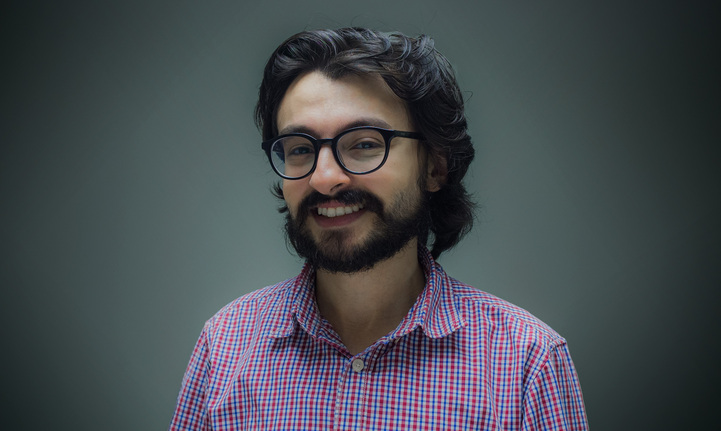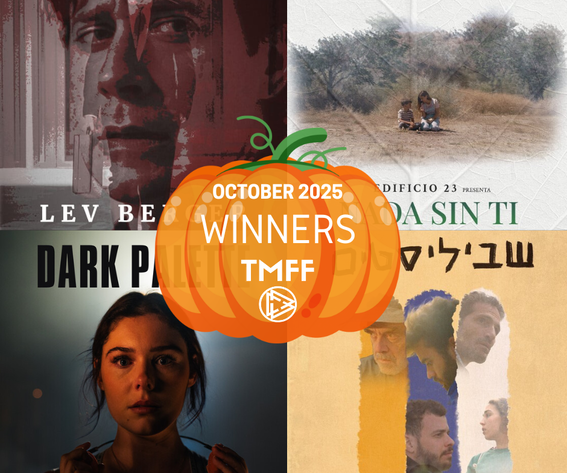October was one of those months when we had so many quality films fighting for the top spot, that it was incredibly hard to agree upon a winner. After much deliberation, the TMFF jury finally selected Okay as the Best Film of the Month. True to an October vibe, it offers a distinct dose of horror, while also making it incredibly relevant in the process. And we had the pleasure to sit down for a talk with director Seif Sayed Abdel Raouf.
JL: Our congratulations on your wonderful film! We had very tight competition in October, and your film came on top – how has it been received at festivals so far?
SSAR: Thank you so much, this has been a blast for us. So far, we haven’t received many festival responses yet, but in the festivals that we were officially selected in, we managed to become a finalist or receive an award or two. I am also very happy that despite our budget, we were selected amongst very high budget films to compete with in these festivals. TMFF was the first festival reply and first major win.
JL: Okay is a film about many things that are not okay in society – especially children growing up with their parents physically there, but never experiencing their love. What was your main aim with the film?
SSAR: It was exactly like you said, we wanted to highlight the huge impact parents have on their children. In the film we focus more on the negative side of things and how the parents’ lack of love could ultimately lead to dire consequences. I also wanted to strongly emphasize on the concept of “regretting your actions” as a parent. The parents begin to realize that they might have been too harsh on their son, but it was too late. They weren’t purely evil at all; they just didn’t realize how far they were pushing their son.
JL: What about the title – Okay – and its repetition throughout the film?
SSAR: It’s a very important part of our culture, that we are raised to always listen to our parents’ requests and its disrespectful to do otherwise. “Okay” is usually used to show obedience and because it’s a typical reply associated with obedience some people use it as an expression to just end a conversation without the intention of doing what they were told. It’s a tactic used to postpone conflict. In the film, however, the parents aren’t even around, and the protagonist does everything he is told and doesn’t use it as an escape, which shows how much influence the parents have on him.
JL: You both wrote and directed the film, and you got awards for both – congrats! Which of the two did you find more difficult?
SSAR: Coming from a non-filmmaking background, I see them equally challenging but having a very good team behind you really makes the process a whole lot easier. That was the case here, and I can’t begin to describe how much I am thankful for everyone being with me every step of the way. Filmmaking is all about collaboration and being able to listen to what other people have to say which I think was essential to the success of the project. Everyone wants their project to succeed but at the end it’s up to the director to steer all those suggestions towards his vision. As a director, this was my first film to have a heavy dramatic element to it, I usually prefer horror/comedy, so it was a great experience doing drama while still maintaining my preferences in style. Fun fact, the story originally came to me when one of the lights in my house started to flicker uncontrollably, so I wrote a horror story about it, then my co-writer Youssef Taha, told me let’s make it a more dramatic film we then kept going back and forth until Okay was made.
JL: Okay was also recognised for the masterful editing. Everything really works well together – the tense atmosphere, the flickering lights. How happy are you with the way it all turned out?
SSAR: I wanted the film to be felt, to be more than just a story being told, I focused on details regarding the sound design, and cuts that would make that happen. I hope that feeling comes across to everyone who would eventually watch the film. I am extremely pleased with the result especially with what happened during the postproduction of the film. I remember clearly, we were furnishing our postproduction studio at the time, and I had to edit the film on a laptop. I finished almost all the film and suddenly all the files and backup files went corrupt. It was insane, we tried to recover the data, but nothing worked. It was such a depressing period, the feeling you get when all your hard work is just thrown the drain. After a few months of just accepting the fact that we lost the entire film, we met a friend who was experienced in IT that had a similar situation happen to him before. He told us that there was a risk that some of the files might be deleted forever, so we took a leap of faith, and it worked all files were restored successfully. I will probably turn this story into a film at some point in my life!
JL: I especially loved some of the camera shots – such as when the main character talks to his father on the phone, the shot is framed with an imposing portrait of the father dominating the scene. How important is this kind of stylistic approach to bringing more flavour to the movie?
SSAR: It’s vital to have the film filled with them. They are added to emphasize something and to push the story and feeling of it forward. You will find many shots; for example, where the portraits of the parents appear in frame, that would always remind you that they surround him in a sense and peer over him. In addition, the change in the aspect ratio itself to represent that change in the atmosphere and how the audience will perceive what is to come.
JL: How long did the shooting take?
SSAR: It was about 3 weeks of production; we had a very rough schedule of about 6 hours per day to shoot and even sometimes 3 hours only. I remember we had to take a break in the middle of production for about 2 weeks due to one of our members catching Covid.
JL: Do you have any upcoming projects in the near future?
SSAR: I am currently writing a short film and in the pre-production phase of another. The one I am writing is a horror, while the one I am prepping is sci-fi. I am very excited for both projects and the challenges they will bring.
JL: Thanks so much for your time! We look forward to watching more of your work in the future!
SSAR: Thank you for the questions, and I feel very grateful for winning the TMFF award of October 2022. I will definitely submit a film again in the future!









Leave a reply